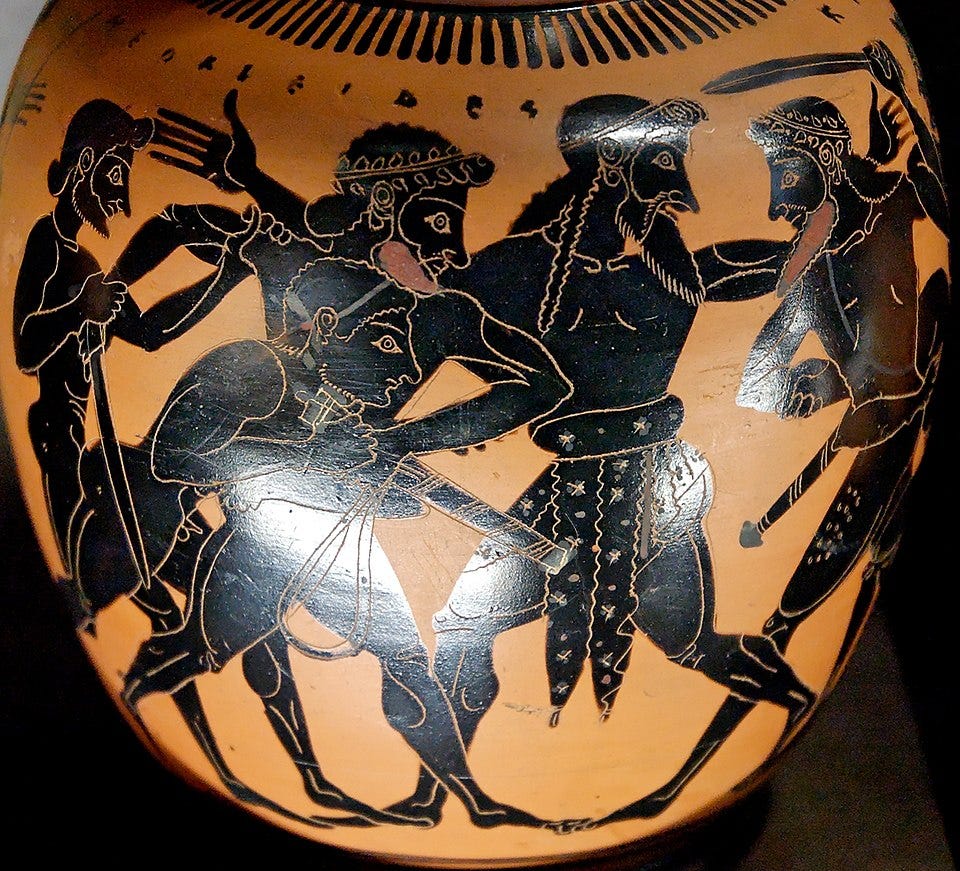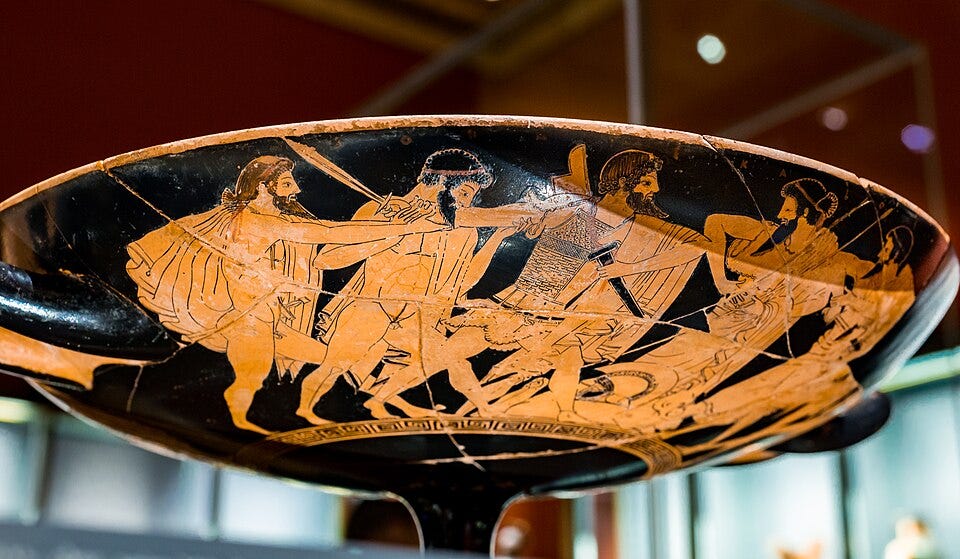This post is a continuation of my substack on the Iliad. All proceeds from the substack are donated to classics adjacent non-profits on a monthly basis. Last year this substack provided over $2k in charitable donations. Don’t forget about Storylife: On Epic, Narrative, and Living Things. Here is its amazon page. here is the link to the company doing the audiobook and here is the press page.
At the beginning of Iliad 14, Agamemnon appears in a panic. All of the leading captains are injured; Hektor has led the Trojans among the Achaean ships on the shore; and there seems to be little hope of reversing the trend. He calls to a small group of leaders and suggests that they row a ship out into the bay and await nightfall to avoid further harm. Then, they might return and lead the rest of the ships home. Agamemnon asserts with a proverbial air that “there’s no shame in fleeing evil, not even during the night” (οὐ γάρ τις νέμεσις φυγέειν κακόν, οὐδ' ἀνὰ νύκτα, 80).
Odysseus responds with incredulity, questioning Agamemnon’s sense before telling him, essentially, to shut up:
Iliad 14.90‑94
“Quiet, lest any other of the Achaeans hear this
Speech, the kind no man would allow out of his mouth at all,
If he’s the sort who knows how to utter apt words in his thoughts,
And is a scepter-bearer, and who an army obeys,
One the size of the one you lead among the Argives.”σίγα, μή τίς τ’ ἄλλος ᾿Αχαιῶν τοῦτον ἀκούσῃ
μῦθον, ὃν οὔ κεν ἀνήρ γε διὰ στόμα πάμπαν ἄγοιτο
ὅς τις ἐπίσταιτο ᾗσι φρεσὶν ἄρτια βάζειν
σκηπτοῦχός τ’ εἴη, καί οἱ πειθοίατο λαοὶ
τοσσοῖδ’ ὅσσοισιν σὺ μετ’ ᾿Αργείοισιν ἀνάσσεις·
The first verb here--σίγα—is an abrupt, even rude way to address the commander in chief. Without a companion imperative such as ἄγε (often combined with imperatives) or a vocative with an honorific, Odysseus expresses his frustration with the leader with a ‘bare’ imperative, both treating him the way one who can’t lead might deserve and shocking him into reconsideration.
This interpretation—that Odysseus is rude to Agamemnon—is not based in the diction (which is not essentially colloquial or harsh) but on a pattern of linguistic behavior rooted in social relationships. Such a pattern is difficult for modern readers to sense without wide reading in Homeric language. But the challenge is that our intuition of social contexts for language may be rooted in our own cultural contexts. A detail or phrase that might seem inappropriate in translation may have a perfectly reasonable (and different) valence in the context.
Sociolinguistics is a multidisciplinary field that examines how social frameworks shape language use (and, sometimes, vice versa). Frameworks within sociolinguistics help us to approach variations in language use even in ancient texts when we do not have recourse to speech communities and competent audiences.
I first started thinking about questions like this while working on my dissertation. I was primarily interested in rhetorical structures and assumptions for Homeric speeches. I spent a few months diagramming every speech in the Iliad and tracking for differences in characterization among the heroes, major devices used by Homeric speakers (e.g. similes, direct-speech, examples from myth), and noticed that there were significant variations based on speech context.
The most marked difference comes in the public speeches of the assembly (ekklêsia) vs. the more private exchanges of the small advisory council (boulê) where the ‘best of the Achaeans’ gather to strategize. Assembly speeches tend to be more structurally complex, vivid, and replete with wide array of rhetorical devices while the council speeches are shorter, more direct, and generally free of what we might consider oratorical ornament. Admittedly, this does not seem to be all that surprising, but as far as I could tell at the time, no one had made that observation before.

Language use is conditioned by speaker-experience and from social structures that govern the application of various rules (politeness/rudeness/deference) and can involve different ‘registers’ or ‘codes’ based on the identities of the speakers. Contextual differences between assembly speeches and council speeches imply that they serve distinct purposes: the rhetoric of the assembly aims for creating group unity or and adjudicating conflict, while also being a venue designed for persuasion. In contrast, the council functions to offer and vet plans. Difference in language use communicates social assumptions about what words can/should do in each circumstance
One of the first articles I read that helped me think in this way was H. Paul Brown’s “Addressing Agamemnon: A Pilot Study of Politeness and Pragmatics in the Iliad (2006). This article looks especially at vocative use and applies frameworks from politeness theory and pragmatics and argues that “the distribution of these forms [vocatives and patronymics] is constrained by the relative social standing of the speaker and the addressee.” The article is important both for the individual arguments it makes and the demonstration that an amalgam dialect like that of Homeric epic still conveys sociolinguistic difference. That is, despite the formulaic nature of Homeric composition, forms of address and imperatives are selected for sociolinguistic reasons within the conventional rhythmic form.
Michael Lloyd’s article about “off the record conversation strategies” (2004) is another one that uses linguistic concepts like conversational implicature to help recuperate implied meanings in the conversation between Achilles and Priam at the end of book 24. (See his more recent piece from 2021 for more on politeness). Subsequent studies like Kirstein 2002, Lentini 2018 have looked at a range of politeness and rudeness, overlapping at time with affect theory. Sometimes studies like this engage as well with etymology and close semantic reading. Jakob Stensgard uses these techniques when he argues that Homeric peithomai should mean assent/consent to rather than “obey” for sociolinguistic reasons (2003).
Elizabeth Minchin has been one of the most important scholars to work on sociolinguistics in Homer. Her book Homeric Voices makes some important advances in distinguishing speaking habits based on gender in Homer (among other conventions). I build on this a little in my article on “Performative Futures”, suggesting that women use a more ‘polite’ or less ‘real’ preface to introduce their own speech acts in Homer. Minchin has written a few recent pieces on sarcasm in Homer. Her piece on sarcasm and the Odyssey—which got me thinking about sociolinguistics for this post—is characteristic of her work: she surveys modern studies on sarcasm, applies the frameworks transparently to Homer, and then offers a few key interpretations to show the value of the work. In particular, she shows how sarcastic language use by the suitors, especially in dealing with beggars and people of lower classes, helps to characterize heroes (and not to the suitors’ benefit).
This approach applies the best of modern and ancient practice. For the former, it means learning from other fields, cultures, and languages, to help us escape the limits of our own linguistic and cultural rootedness, to reimagine what language can or may do. For the latter, it is essentially a reformulation of the Aristarchean principle that “one must clarify Homer through Homer”. This means that the forms, uses, and general rules of Homeric language are best judged by the patterns evident in the epics themselves. While culturally competent speakers of Homeric Greek are not available to us, we can recuperate some understanding ourselves by listening to Homer carefully. And repeatedly.
Short Bibliography
Brown, H. Paul. “Addressing Agamemnon: a pilot study of politeness and pragmatics in the « Iliad ».” TAPA, vol. 136, no. 1, 2006, pp. 1-46.
Christensen, Joel P.. “First-person futures in Homer.” American Journal of Philology, vol. 131, no. 4, 2010, pp. 543-571.
Conti, Luz. “Sobre el valor pseudo inclusive de la primera persona del plural en la « Ilíada ».” Glotta, vol. 99, 2023, pp. 2-20. Doi: 10.13109/glot.2023.99.1.2
Kirstein, Robert. “Emotions and politeness in Homer’s « Odyssey ».” Emotions and narrative in ancient literature and beyond: studies in honour of Irene de Jong. Eds. De Bakker, Mathieu, Van den Berg, Baukje and Klooster, Jacqueline. Mnemosyne. Supplements; 451. Leiden ; Boston (Mass.): Brill, 2022. 119-134. Doi: 10.1163/9789004506053_009
Lentini, Giuseppe. “(Im)politeness in the « Iliad » : the pragmatics of the Homeric expression ἀγαθός περ ἐών.” Trends in Classics, vol. 10, no. 2, 2018, pp. 255-274. Doi: 10.1515/tc-2018-0020
Lloyd, Michael. “The Politeness of Achilles: off-record conversation strategies in Homer and the meaning of kertomia.” The Journal of Hellenic Studies, vol. 124, 2004, pp. 75-89. Doi: 10.2307/3246151
Lloyd, Michael (Michael A.). “Positive Politeness and Mock Politeness in Homer”. Scienze dell'Antichità 27, no. 3 (2021)
Martos Fornieles, Marina. “Análisis del diálogo de Odiseo y Nausícaa (Od. 6.148-197) desde la perspectiva de la cortesía verbal.” Veleia, vol. 39, 2022, pp. 129-141. Doi: 10.1387/veleia.22760
Minchin, Elizabeth. “From gentle teasing to heavy sarcasm:
instances of rhetorical irony in Homer's « Iliad ».” Hermes, vol. 138, no. 4, 2010, pp. 387-402.
Minchin, Elizabeth. “The expression of sarcasm in the « Odyssey ».” Mnemosyne, Ser. 4, vol. 63, no. 4, 2010, pp. 533-556. Doi: 10.1163/156852510X456192
Minchin, Elizabeth. Homeric voices: discourse, memory, gender. Oxford ; New York: Oxford University Pr., 2007.
Stensgaard, Jakob. 2003. “Peitho in the Iliad: A Matter of Trust or Obedience?” Classicalia et Medievalia 54: 41–80.





